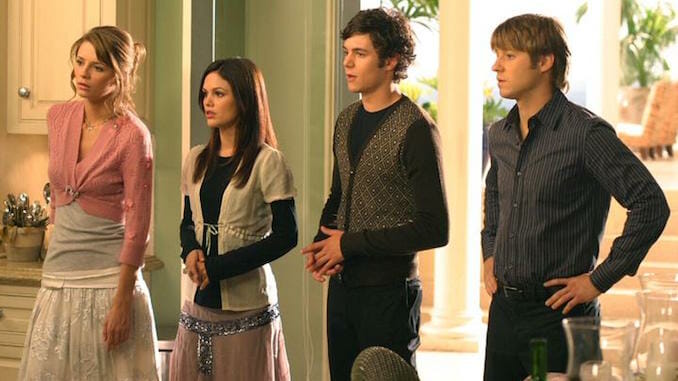It Still Stings: The O.C. Is a Cautionary Tale of What Happens When a Show Can’t Reinvent Itself
Photo Courtesy of FOX
Editor’s Note: TV moves on, but we haven’t. In our feature series It Still Stings, we relive emotional TV moments that we just can’t get over. You know the ones, where months, years, or even decades later, it still provokes a reaction? We’re here for you. We rant because we love. Or, once loved. And obviously, when discussing finales in particular, there will be spoilers:
![]()
Fox’s teen drama The O.C. is mostly remembered as the show that made Death Cab For Cutie a household name, and that’s only if it’s remembered at all. But in the 2003-2004 TV season, The O.C. was one of the biggest and buzziest TV shows in existence, as “Welcome to The O.C., bitch,” peaked as a full-on global phenomenon.
Much like Ryan Atwood joining the Cohen family, the beach-set soap came out of nowhere. But its fall from grace a mere three seasons later came just as swiftly. By The O.C.’s final season, it had all come crashing down in a meandering, snarkily self-deprecating shell of what it once was.
The bright, splashy teen soap started with a gloriously simple premise: wayward teen Ryan Atwood (played by a young Ben McKenzie before he grew up and became a cop on Southland and Gotham) is adopted by the affluent Cohen family, where this kid from the wrong side of the tracks gets a new shot at life in the ritzy world of Newport Beach, California. This being a teen soap, there’s also a love story (or two) to serve as a throughline, as Ryan falls for the literal rich girl next door Marissa Cooper (Mischa Barton). Ryan’s arrival also helps the Cohen’s nerdy son Seth (Adam Brody) gain just enough coolness points to catch the eye of his lifelong crush, Summer (Rachel Bilson).
The grown-up yin to the teen drama yang was the story of the parents doing their best to raise their children in the often spoiled, fake world of Newport. Public defender Sandy Cohen (Peter Gallagher) kicks off the whole show by lending a helping hand to Ryan. The adult cast is rounded out by Sandy’s wife Kirsten (Kelly Rowan), Kirsten’s father and area business leader Caleb Nichol (Alan Dale), and Marissa’s parents Julie (Melinda Clarke) and Jimmy (Tate Donovan).
The O.C. worked best as a hangout-and-vibe type of show, inexplicably bringing A-list stars to a dive bar venue, following Seth as he tries to launch his own comic book, and waiting patiently to see who Ryan might punch next.
-

-

-

-

-

-

-

-

-

-

-

-

-

-

-

-

-

-

-

-

-

-

-

-

-

-

-

-

-

-

-

-

-

-

-

-

-

-

-

-








































